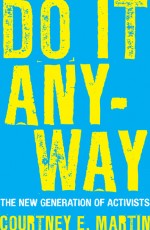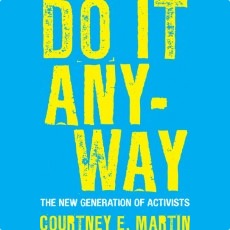Do You Want To Change The World?
 My friend Courtney Martin has just written a wonderful book, DO IT ANYWAY, profiling 8 activists who are striving to do just that.
My friend Courtney Martin has just written a wonderful book, DO IT ANYWAY, profiling 8 activists who are striving to do just that.
I must confess… as someone who is in that awkward career stage – having left the financial services industry after 15 years to pursue my passion of teaching women to become more financially empowered – I am absolutely fascinated about the interplay between activism and money. While this is not the primary focus of Courtney’s ground-breaking new work, she was kind enough to answer the kind of questions financially inquiring minds want to know. Enjoy! (Note: you can follow Courtney on Twitter at @MartinCourtneyE)
Courtney, as Jane Fonda so eloquently says, DO IT ANYWAY addresses that most heartfelt of questions: How can I make my life meaningful?” In your conversations with the 8 amazing activist you profile, what role did money play in the answering of that question?
What commonalities (or differences) did you see amongst the way these 8 inspiring activist were raised to think about the relationship between money and societal impact?
Nia Robinson-Martin, an environmental justice advocate from Detroit, was raised by two civil rights activists, so money and its capacity to liberate, oppress, and separate us was the water she swam in growing up. Tyrone Boucher inherited $400,000 upon graduating from high school and decided to give it all away, much to his father’s chagrin. Tryone is part of a new group of wealth inheritors called Resource Generation, who are really deconstructing what it means to have wealth and how to live a line that lines up one’s value, and one’s way of handling money. It’s really explosive stuff.As you were researching DO IT ANYWAY, did you notice any meaningful gender differences in the ways in which the women and men you profile related to money in the context of achieving their life’s missions?
Well, interestingly, Tyrone is transgendered. He came out as queer, and then male, while traveling the country after dropping out of Stanford. It was, in part, his own personal experience of “otherness” that helped him be critical of the wealth disparity that exists in this country, and later, the traditional system of philanthropy.What do you personally – as one of the most influential voices of new feminism – know about money today that you wish you had known 5 or 10 year ago as you think about the impact you want to make with your life?
What a great questions! I think the most important thing I’ve learned came from my friend Chris, who actually helped me produce the short videos of each activist that you can find on our website. He’s an ad executive, a very successful guy who came from a low-income background, and he told me, “Courtney, money is just a tool. No more. No less.” I think that’s the most liberating and empowering way to look at it. It’s not your worth. It’s not your ticket to happiness. It’s simply a very powerful tool.
So, what about YOU – do you have urges to change the world & if so, what role does money play in your thinking?

